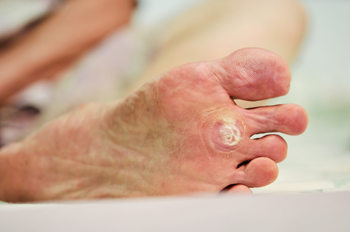
It can be easy to notice a plantar wart, which is a small, hardened area on the bottom of the foot. They may have tiny black dots in the center and grow into the foot as a result of the pressure that is exerted by standing and walking. The medical term for this ailment is verruca plantaris, and it is caused by the human papillomavirus (HPV). It is considered to be contagious, and enters the body through small cracks in the skin of the feet. Research has shown there are two types of plantar warts. A single plantar wart is classified as a solitary plantar wart, though smaller warts may form from it. Mosaic plantar warts are found in clusters and may require more extensive treatment methods. Patients who have compromised immune systems may be susceptible to developing these types of warts, in addition to children and older people. Prevention techniques can include wearing appropriate footwear while in public shower rooms, locker rooms, or swimming pools. If you think you have plantar warts, it is suggested that you confer with a podiatrist who can provide you with correct treatment options.
Plantar warts can be very uncomfortable. If you need your feet checked, contact Jim Maxka, DPM from South Penn Foot & Ankle Associates. Our doctor will assist you with all of your foot and ankle needs.
About Plantar Warts
Plantar warts are the result of HPV, or human papillomavirus, getting into open wounds on the feet. They are mostly found on the heels or balls of the feet.
While plantar warts are generally harmless, those experiencing excessive pain or those suffering from diabetes or a compromised immune system require immediate medical care. Plantar warts are easily diagnosed, usually through scraping off a bit of rough skin or by getting a biopsy.
Symptoms
- Lesions on the bottom of your feet, usually rough and grainy
- Hard or thick callused spots
- Wart seeds, which are small clotted blood vessels that look like little black spots
- Pain, discomfort, or tenderness of your feet when walking or standing
Treatment
- Freezing
- Electric tool removal
- Laser Treatment
- Topical Creams (prescription only)
- Over-the-counter medications
To help prevent developing plantar warts, avoid walking barefoot over abrasive surfaces that can cause cuts or wounds for HPV to get into. Avoiding direct contact with other warts, as well as not picking or rubbing existing warts, can help prevent the further spread of plantar warts. However, if you think you have developed plantar warts, speak to your podiatrist. He or she can diagnose the warts on your feet and recommend the appropriate treatment options.
If you have any questions please feel free to contact our office located in Hanover, PA . We offer the newest diagnostic and treatment technologies for all your foot and ankle needs.
